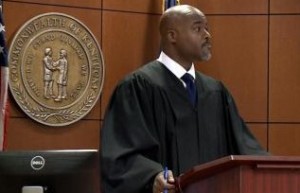 In a local courtroom, a defendant quickly learned that words matter.
In a local courtroom, a defendant quickly learned that words matter.
On Monday, January 4, 2016, Judge Olu Stevens was going through his criminal docket in Jefferson Circuit Court in Louisville, Kentucky. In the case of Adam Satterly, Judge Stevens revoked his bond on drug charges. As Satterly exited the courtroom, he shouted from the hallway “Punk A** N****!”
wave3.com-Louisville News, Weather
While it shouldn’t matter–those words are disrespectful in any courtroom–Satterly happens to be white and Judge Stevens is an African-American.
After a moment, Judge Stevens had deputies bring Satterly back into the courtroom. Here was the exchange:
Judge: “Is there something that you wish to say to me?”
Satterly: “Na, that was to my brother.”
Judge: “That’s to your brother? Because I heard you say a racial epithet.”
Satterly: “No, no, no I didn’t mean it like that.”
Judge: “Oh, you didn’t mean it like that?”
Satterly: “Na.”
Judge: “Well, I tell you what, I’m going to hold you in contempt of court for having said that and you don’t speak those words in here and that word particularly.”
Satterly: “Yes sir.”
Judge: “You don’t use that word, I’m going to give you 60 days for having used that word.”
As Judge Stevens’ ruling demonstrated: words matter.
We all enjoy the freedom of speech guaranteed by the First Amendment, but that does not mean we enjoy the freedom from the consequences of our speech.
Realizing that, Satterly was in court the next day to apologize.
After apologizing, Judge Stevens reduced Satterly’s contempt sentence to time served and removed the remaining 59 days.
This month we celebrate Martin Luther King, Jr. Day–two weeks after Satterly’s bond hearing. The incident in Judge Stevens’ courtroom serves as a reminder of the need to remember the legacy of Dr. King and his charge to judge men by the content of their character and not the color of the skin.
Particularly when the man being judged is a Judge.